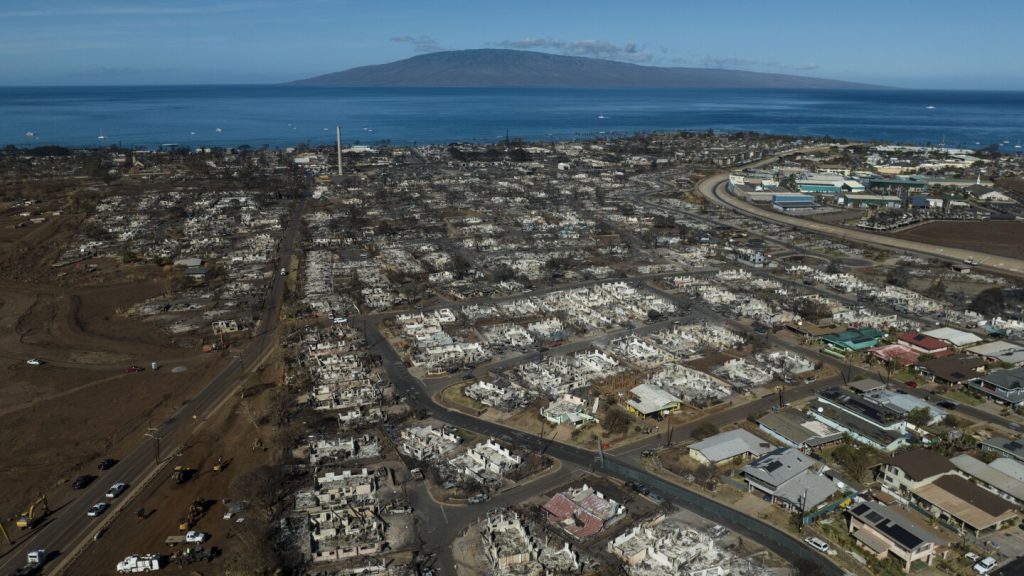Hawaii Supreme Court Ruling Paves Way for $4 Billion Settlement in Maui Wildfire Case
A Landmark Decision for Justice and Healing
In a significant legal ruling, the Hawaii Supreme Court decided on Monday that insurance companies cannot pursue separate legal actions against those held responsible for the devastating 2023 Maui wildfire. This decision effectively removes a major obstacle to a $4 billion settlement, which had been on the brink of collapse. The settlement, announced last summer, aims to compensate thousands of individuals affected by the catastrophic fire. While the ruling resolves a critical hurdle, further steps are still required to finalize the agreement, which involves multiple defendants, including Hawaiian Electric Company, the state of Hawaii, Maui County, and Kamehameha Schools.
The Maui wildfire, which occurred on August 8, 2023, is considered the deadliest in the U.S. in over a century. It ravaged the historic town of Lahaina, claiming the lives of over 100 people, destroying thousands of properties, and causing an estimated $5.5 billion in damages. In the aftermath of the tragedy, hundreds of lawsuits were filed against the defendants, alleging liability for the disaster. The settlement, while not fully compensating for the losses, represents a crucial step toward justice and recovery for the victims and their families.
Insurance Companies’ Legal Challenge and Its Implications
At the heart of the legal battle was whether insurance companies could independently seek reimbursement from the defendants through a process known as "subrogation." Subrogation allows insurance companies to recover the funds they have paid out to policyholders by pursuing legal action against the parties deemed responsible for the damage. Initially, insurance companies argued that they should have the right to pursue separate legal actions to recoup their payments, a stance that threatened to derail the settlement.
However, the Hawaii Supreme Court ruled that state laws limiting such actions apply not only to health care insurance but also to casualty and property insurance. This decision effectively barred insurance companies from pursuing independent legal claims, aligning with the concerns of plaintiff attorneys who feared that allowing such actions would deplete the settlement funds available to victims and prolong litigation unnecessarily.
A Settlement for the People, Not Just for Insurance Companies
The $4 billion settlement, announced by Hawaii Governor Josh Green just days before the one-year anniversary of the fire, marked a significant milestone in the journey toward justice for the victims. The agreement involves seven defendants, including Hawaiian Electric Company, the primary defendant accused of sparking the blaze. Other defendants include the state of Hawaii, Maui County, and Kamehameha Schools, the largest private landowner in Hawaii.
While the settlement amount falls short of the estimated $5.5 billion in damages, attorneys for the plaintiffs acknowledged that it was the best possible outcome given Hawaiian Electric’s limited financial resources. They expressed concerns that Hawaiian Electric could face bankruptcy, which would further reduce the funds available to victims. "They need every penny to restitch the fabric to bring the community back together," said attorney Jesse Creed during a hearing before the state Supreme Court.
Creed’s words carry additional weight, as he has personally experienced loss in recent wildfires, including the Palisades fire near Los Angeles. His empathy underscores the emotional toll of such disasters and the importance of a timely settlement to aid the healing process.
Reactions to the Ruling and the Road Ahead
The Hawaii Supreme Court’s ruling has been met with relief and optimism from plaintiff attorneys and victims’ families. Gerald Singleton, one of the attorneys representing the plaintiffs, expressed satisfaction with the decision, stating, "Now the settlement can take the next step forward." The ruling sends the case back to a Maui judge, who will oversee the next steps in finalizing the agreement.
Governor Josh Green has also welcomed the decision, calling it a crucial step toward healing for the affected communities. "Today’s decision will help our people heal much sooner, as we continue to rebuild and recover," he said in a statement to the Associated Press. Green has been a vocal critic of insurance companies’ attempts to recover funds through subrogation, labeling the practice as unfair to policyholders who have already suffered immense losses.
The Broader Implications of Subrogation and Insurance Practices
Insurance companies argue that subrogation is a necessary mechanism to offset the costs of catastrophic events, thereby preventing a spike in insurance premiums for policyholders. However, this process is not typically applied to natural disasters like hurricanes, where liability is not clearly established. Instead, it is used in cases where negligence or fault can be proven, such as the Maui wildfire.
Despite their arguments, the court’s ruling suggests that the rights of victims to receive timely compensation should take precedence over insurers’ financial interests. The decision highlights the tension between the legal rights of insurance companies and the need for justice and recovery for those affected by tragedies. By limiting the ability of insurance companies to pursue separate legal actions, the Hawaii Supreme Court has prioritized the well-being of the victims and the broader community.
Looking Ahead: Healing and Rebuilding
As the settlement moves forward, attention will shift to the distribution of funds and the ongoing efforts to rebuild the affected communities. The Maui wildfire has left an indelible mark on the people of Hawaii, but the court’s ruling offers hope for a brighter future. While no amount of money can fully compensate for the loss of life and property, the $4 billion settlement represents a significant step toward accountability and healing.
The case also serves as a reminder of the importance of legal frameworks that prioritize the rights of victims in the aftermath of disasters. As the people of Maui continue to rebuild and recover, the ruling underscores the power of the justice system to deliver fair outcomes even in the face of overwhelming tragedy.












